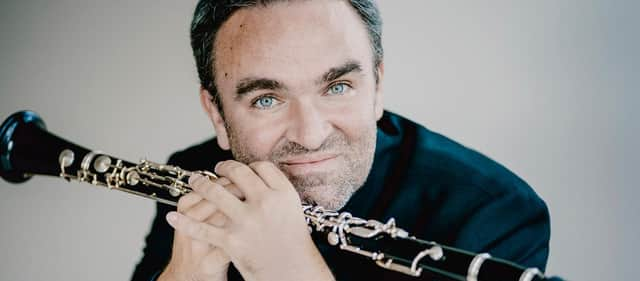Music review: BBC SSO & Jörg Widmann, City Halls, Glasgow


BBC SSO & Jörg Widmann, City Halls, Glasgow ***
The BBC SSO has kept very quiet about it, but Thursday effectively marked clarinettist/composer/conductor Jörg Widmann’s debut as the orchestra’s new artist-in residence. Even the orchestra was surprised when Widmann blurted out the news at a rehearsal earlier in the week.
It shouldn’t be something to keep schtum about, given Widmann’s lively, outgoing and musically eccentric disposition. He demonstrated as much last season in a streamed concert with the RSNO. Could he replicate the dynamism which characterised that performance, especially in a similarly-structured programme that opened with a clarinet concerto, continued with one of his own pieces and ended with a hefty German Romantic symphony?
Advertisement
Hide AdAdvertisement
Hide AdI suspect he and the SSO will eventually develop an exciting relationship. There were sufficient positive signs in this maiden programme, but there were also indications that complete synergy will take time.
Widmann’s directorial style is to do very little in performance, signalling important junctures, but effectively leaving the players to engage reactively by themselves. Leader Laura Samuel’s controlling influence was key here, ensuring their togetherness, no mean feat given Widmann’s idiosyncratic fieriness as a soloist.
That was paramount in Weber’s First Clarinet Concerto, Widmann as frontline protagonist taking every opportunity to exaggerate its melodramatic restlessness, the band sounding a little anxious to begin with but eventually attuning to his vibe. The best came in the exquisite Adagio, but Widmann’s preoccupation with his own role left too many untidy moments, not to mention his initial tuning.
Clarinet discarded, he conducted his own Con brio, written as a companion piece to Beethoven’s Seventh and Eighth Symphonies, a wacky compression of key fragments of the two concealed within surreal wrapping. Then a robust and distinctive Schumann Second Symphony, plentiful interest within, marred only by undue fussiness and some misjudged instrumental balance.
A message from the Editor
Thank you for reading this article. We're more reliant on your support than ever as the shift in consumer habits brought about by coronavirus impacts our advertisers.
If you haven't already, please consider supporting our trusted, fact-checked journalism by taking out a digital subscription at https://www.scotsman.com/subscriptions